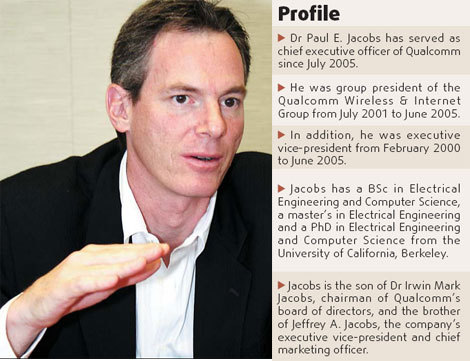
|
BIZCHINA> Center
 |
|
Related
3G a long time coming; local suppliers ready
(China Daily)
Updated: 2008-10-07 10:21 The third-generation (3G) era is just around the corner, with the telecom restructuring nearing completion. As the world's major provider of code division multiple access (CDMA), Qualcomm Inc has gained a lot from the rise of Chinese telecom manufacturers like ZTE and Huawei. Last year, 21 percent of Qualcomm's revenue came from China. The telecom provider recently settled with Nokia on a lengthy and high-profile patent dispute. Its former chief operating officer Sanjay Jha left the company after 14 years to take the helm at struggling Motorola. So with 3G licensing finally in sight, Qualcomm Chief Executive Officer Paul Jacobs spoke with China Daily's Wang Xing about the new 3G market in China.
 Q: What's your view on the Chinese market when 3G licenses are finally released? A: We are very excited about 3G being launched in China. I think the market can be obviously huge. I also think that the local manufacturers can play a major part in it. The Chinese manufacturers have built a market overseas, an export market, for their products. A lot of times you look at it the opposite way and you think that the manufacturer will have a home market to sell in and then they'll export afterwards. With 3G it's been the other way around, so we've worked with a lot of the manufacturers to sell into the export market working, say, for example, with Huawei selling into Vodafone, or ZTE selling into Telecom Italia, or whatever it was. So, I think those companies are well positioned. With 3G launching here, they will have built up their capabilities and now are going to be able to sell in this market and compete very well. Q: How many 3G users do you expect when the licenses are issued? A: Eventually 1.3 billion I was making a joke. We've seen in other markets fairly rapid turnover. If you look at Western Europe, you're already seeing CDMA take net adds and GSM is going down with negative net adds. So, I couldn't tell you exact numbers, but I look at some of the projections that we've seen from operators. China Telecom put out some pretty aggressive numbers. So we're excited about that and we think that over time, basically everybody will migrate to 3G. Q: In the long run, especially considering China's huge population, what proportion do you think China will count for in your revenue in, say, five or 10 years? A: It depends on how you look at the revenue, because right now if you look at our revenue in terms of where we sell to and where the product is manufactured, it's 21 percent for 2007 and we think that will obviously grow substantially if the domestic manufacturers gain a large share of the Chinese market. We expect their market share in China to be larger in China than it is outside of China. Today, the largest percentage of our revenue comes from South Korea. Their number is 31 percent. So a lot of that comes because Samsung and LG sell not only in South Korea, but outside. So, depending on the relative market shares between them and the Chinese manufacturers, and you also have in the CDMA side, Nokia and Sony Ericsson. So it's hard for me to tell today, but I would imagine that most of those products would get built in China anyway, even for those manufacturers, so that would cause the percentage to go up pretty rapidly. Q: Can you give more detail on how Qualcomm reached an agreement with Nokia, given the length of the dispute? A: You know, it's interesting, because the same teams that were negotiating before were the same ones that got the deal done. So it wasn't because we made a change in people. It just happened that each time we felt we made progress, we would get to a certain point and we wouldn't make progress. And I've always been saying that I think that some external event would help us to actually come to an agreement. And in this case, it was the case in Delaware and we only had one hour left before the judge said that you're going to start the trial and we got the deal done. So I had a final phone call with Olli-Pekka and we had discussed one last issue, came to an agreement on it, but the teams had been awake for 40 hours straight negotiating and in one last hour we finalized that last deal and got it done. Q: Do you think the Nokia settlement will have a positive impact on your legal disputes with other companies or on future cooperation with Chinese manufacturers? A: I hope that it does. I don't know right now. The other legal issues are continuing. We're certainly going to try and resolve whatever we can, but it has to be a win-win solution. The nice thing about the Nokia deal is that it turned into a win-win deal. So I feel right now is a very good time for Qualcomm where we have opportunities to improve our relationships across the board and obviously the partners we've been working with. (For more biz stories, please visit Industries)
|